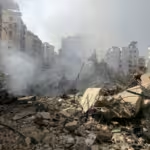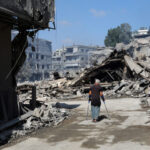Aerial Bombing of Dahieh Impact
The latest airstrike that killed Hezbollah leader Hassan Nasrallah has left a profound impact on the suburb of Beirut known as Dahieh, causing the ground the people of this suburb were walking on to shake. Many witnessed how this once–thriving community had turned into a landscape of destruction with families seeking shelter in the rubble of their houses-for example, Mehdi Moussawi and his wife, Zahraa.
Dahieh is one of the most densely populated areas in southern Beirut and has been dominated for decades by the powerful political and paramilitary movement Hezbollah. ‘The narrow streets and closely packed buildings of this suburb house a highly heterogeneous population. But tragic air strikes have just befallen its residents’ lives. At least 65 air attacks took place during the past weeks, destroying many homes, businesses, and community buildings. Here is the word of Mehdi, a 45-year-old taxi driver: “The missiles come down from the sky, and suddenly everything you have is gone.”
Personal Stories of Loss
The Moussawi family, among others. To survive, the family would have to occupy part of this unfurnished apartment, once a haven, now uninhabitable; reduced to a blackened shell. Zahraa said, “Our home has gone. We do not have hygiene. We can’t wash ourselves. We do not have anything.” As they try to carry on with life in the streets, hundreds of them like this, Their loss is palpable.
A mix of Reactions from the Community
Even though the conflict has already caused significant tension within the community, reactions have been mixed. Many Shi’ite Muslims in Dahieh remain opposed to Israel. Its thinkers were considered their defenders in such chaotic times. “If anything, it only increases our support,” said Gharib Ali, a janitor who fled the suburb. Some others, however, especially among non-Shi’ite residents, have begun questioning the group’s role in the conflict that has been brewing. “This war is hurting everyone,” laments Sameera, a Sunni Muslim, who vented her frustration over the destruction.
Israeli Strategies and Community Resilience
According to experts, the actions conducted in Dahieh are one aspect of a more general policy to weaken Hezbollah. Political analyst Prof. Amal Saad said: “The Israeli policy has changed into what she describes as a “Gaza doctrine,” “strategic targeting and displacing communities.” The official says its objective is to weaken Hezbollah’s control by putting pressure on the Lebanese population.
Hope amid Despair
In the aftermath of the bombings, such vigor defines the residents of Dahieh. After the relative lull of a ceasefire, families cautiously returned, assessing the damage to their homes and retrieving belongings. “We knew it was just a matter of time,” Mehdi reflected when strikes resumed. Still, this destruction will not stop them from rebuilding. “We will return. God willing, before the rains come,” said Zahraa in a committed display by a community that refuses to give in to desperation.
Call for Awareness and Advocacy
The scenario in Dahieh starkly reminds one that human beings are a price paid for war. The plight of the family, caught in the pangs of uncertainty, was already underlined as highlighting issues of compassion and understanding at times of turmoil. ‘An awareness should be created about the plight of civilians in war-torn areas like Dahieh and advocacy for peace and humanitarian support. Share this article to shed light on the human story of conflict, and join the conversation about how we can make a difference for displaced communities.
For more reporting like this, please follow Newsdecensored on your favorite social media sites and bookmark the website. Thank you for your interest and support.















